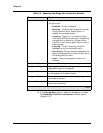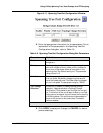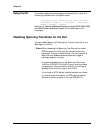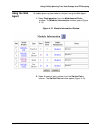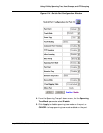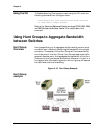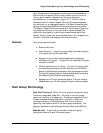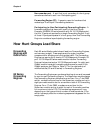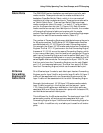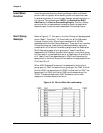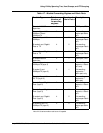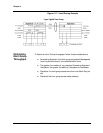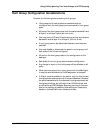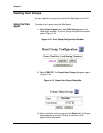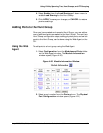
4-30 Avaya P550R, P580, P880, and P882 Multiservice Switch User Guide, Version v5.3.1
Chapter 4
Non-member port - A port that is not a member of a hunt group.
sometimes referred to as a “non-Participating port”.
Forwarding Engine (FE) - A generic name for hardware that
makes layer 2 and layer 3 forwarding decisions.
Participating (or Non-Participating) Forwarding Engine - A
forwarding engine that has a port is part of the Hunt Group.
Example, a M8024 (80 series module with 24 10/100 Mbps ports),
the first 12 ports are serviced by a single Forwarding Engine. If any
of those 12 ports participates in a hunt group, then that Forwarding
Engine is considered a participating forwarding engine.
How Hunt Groups Load Share
Forwarding
Engines and
Fabric Ports
Each 80 series Media module has at least two Forwarding Engines,
and as many as eight. These engines are the major hardware
components for bridging and routing data traffic. The Forwarding
Engines can service up to twelve 10/100 Mbps ports. Example, 24-
port 10/100 Mbps 80 series media module has two Forwarding
Engines that service twelve 10/100 Mbps ports each. An eight-port
Gigabit module has eight forwarding engines one for each of the
Gigabit ports per slot. Refer to Table 4-7 for the relationship of
media modules (50 and 80 series) to Forwarding Engines.
80 Series
Forwarding
Engines
The Forwarding Engines are numbered starting at one and increased
by one for each Forwarding Engine. The Supervisor module always
has Forwarding Engines numbered one and two. For a 7-slot P580
switch, numbers one and two for the Supervisor module and up to
eight per media module slot for a maximum total of 50 Forwarding
Engines. For a 17-slot P882, numbers one and two for the
Supervisor module and up to eight for each of the media modules,
for a maximum total of 130. The numbering sequence will vary
depending on the type and total number of media modules. If the
switch has empty slots the numbering sequence is bypassed for the
empty slots.



